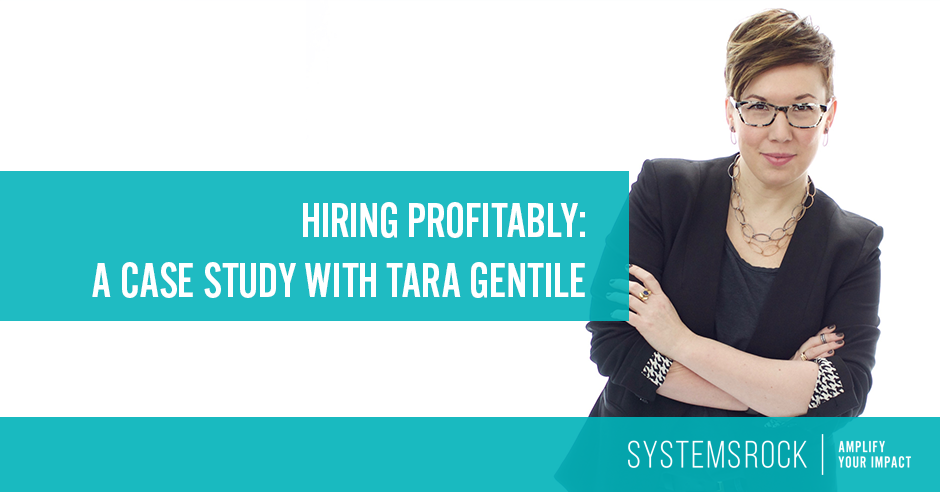What happens when you hire profitably?
We’ve talked a lot recently about what it means to hire profitably. If you’ve read my most recent posts, you’ve seen my recommendations for moving beyond skills and abilities to consider personality and cultural fit before making a hiring decision.
You’ve also seen my suggestions for an onboarding system that empowers your new team member and allows them to really take ownership of their place in your organization.
Today, I’m sharing a case study of Tara Gentile. You will see how hiring profitably prepares your team members to be successful which benefits the group as a whole. Together, we’re sharing her experience with hiring profitably as she added a new community manager to her team.
If you don’t know Tara, she is the creator of Quiet Power Strategy™ which offers hands-on business training & support for idea-driven entrepreneurs and CoCommercial, a network of small business owners growing their businesses online & off. Tara is the author of several books, a sought-after speaker, and a frequent CreativeLive instructor.
Tara’s story…
When Tara Gentile needed a Community Manager for CoCommercial, she decided to try a new approach to hiring. Rather than hiring based on traditional factors such as industry knowledge and existing connections, Tara and her COO, Rosie, expanded their understanding of their requirements.
The Community Manager role requires interaction with members of the community. A role which demands a high level of engagement and energy. They realized that they needed an extrovert who would enjoy taking initiative and reaching out in a positive way. Personality was as or more important than experience.
Tara says, “We’ve only ever hired from within our community in the past — people who know what’s going on, what we do, and who we do it for. Hiring Shannon was a big leap because not only was she learning a new job, she was learning a whole new industry.”
Adding Shannon to the team “could have been a nightmare” without an intentional onboarding process to position her for success. But instead, Rosie developed a three-part onboarding strategy to help Shannon get acquainted and begin owning her role at CoCommercial.
First, Rosie guided Shannon through the software and programs the team uses to do their work. Rosie says “We touched a bit on the reasons for choosing each one and how they play together.” Rosie directed Shannon to read through the culture document, communications procedures, and other documents so she would understand how the tools they use support their mission and values.
Next, it was Tara’s turn to immerse Shannon in the culture, vision, and values of CoCommerical. In preparation for their time together Shannon reviewed the CoCommercial’s Team Culture Guide making her time with Tara as impactful as possible. While they were together, Tara communicated clearly “what the company is all about, why we do what we do, and how Shannon’s role would impact our mission”. She also answered Shannon’s questions and they discussed how Shannon’s role fits into the organization as a whole.
Once Shannon understood the bigger picture and the team’s commonly used tools, Rosie leads her through the details of each project she would be involved in moving forward. They discussed the best ways to be responsible for the mission of the project and how to “own” the project. Then Rosie showed Shannon how to make her own tasks and documents in order to accomplish the goals.
Rosie shared that the process of onboarding was not completely perfect, however. She says, “The onboarding process is a living, breathing thing. It’s important to be open to adjusting it as you go along so you can add things you’ve missed and make improvements along the way.”
What effect did this intentional onboarding process have for the team at CoCommercial?
The three-part process wasn’t necessarily quick, but it was extremely thorough. “I learned from Natasha that it was just as important for a new team member to know the WHY of what needed to be done as the HOW of what needed doing.”, said Rosie. “Doing so enabled Shannon to own the outcome.”
From Tara’s perspective, the outcome has been exactly what she needs. “Shannon started to own her role as soon as her first training session ended. She might not have had all the pieces yet but she was invested enough in our success to step out with confidence in her new role”.
And here’s how Shannon reflects on her onboarding experience: “Rosie and Tara treated me with respect, answered all of my questions no matter how far-ranging, and provided me with a sense of collaboration and ownership from the moment we started talking about my coming aboard the team. “


